Spruce up your sales in a solid category where c-stores lead the way
1. Laundry and household is growing faster in convenience than in the mults
2. Dish-wash sales in convenience are up 6.6%
3. Bleach and toilet products dropped -6.2% in the independent channel
4. Rising costs are seeing some consumers switch to own brand products
5. Post-Covid cleaning brands need to ‘re-engage’ consumers
6. Air Care dips -5.5% year-on-year in independents
7. Sustainable cleaning is becoming mainstream
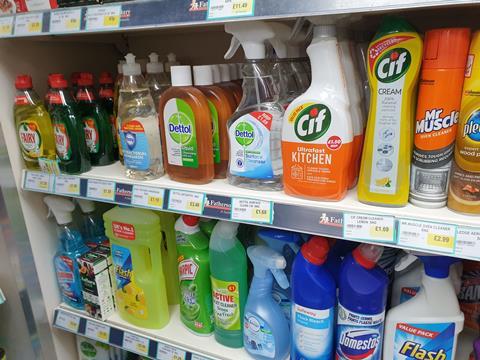
1. Laundry and household is growing faster in convenience than in the mults
Following the intense Covid-19-inspired focus on household cleaning in 2021, business is now returning to usual in the convenience aisles.
And now the suds have cleared convenience stores look like they’re besting the mults in some key cleaning categories. While supermarket sales have fallen £1.1bn year-on-year in Laundry and Household after lockdown – in independents they’re up 2.8% to top a not-too-shabby £104m (Nielsen/IRI).
One of the key segments fuelling this rise is laundry. Matt Stanton, head of insight at DCS Group, says that a central value driver for convenience is brands pivoting from powder to other more compact formats that sit better on c-store shelves.
“One of the main growth drivers in laundry is the switch from powder into capsules, gels and liquids,” he says.
“The products cost a little more, but consumers are looking to run cooler wash cycles to save energy and reduce household bills, and the liquid formats work well at cooler temperatures, whereas powder generally works best at 40°C or above.”
The wealth of different formats means that retailers have to keep their product ranges tight and focus on the best-sellers. Richard Inglis, owner of several stores in Southampton, says that Covid-19 helped clarify brands’ c-store offer.
“It’s pointless stocking every single kind of format and fragrance in cleaning,” he says. “Now we just have one brand of bleach (alongside an own-brand version) and we don’t worry about whether it’s ‘pine fresh’ or ‘mountain’. During Covid we found that suppliers weren’t able to get us the full range. And then after Covid they decided not to bring them all back – which I think is a good thing.”
Richard has also invested in products from a brand called HG who span the whole cleaning spectrum. They provide everything from toilet unblockers to carpet cleaners, all of which go up on a stand in-store.
“It goes quite well because when customers come in looking for a cleaning solution they can find it quickly – it quickly meets the need and the service,” he says.

2. Dish-wash sales in convenience are up 6.6%
(IRI)
It seems that more dishes got washed in the UK than ever last year. Sales in the convenience channel hit £18.7m after a nifty 6.6% uplift (IRI).
The rise illustrates how post-Covid consumer behaviours are affecting the cleaning market. With more people working from home more often consumers have to wash more dishes for at-home meals.
Stanton adds that the cost-of-living crisis could be fuelling the rise too – with shoppers eschewing costly meals out.
“A key driver of the growth in dish washing is that people are eating out less often, and therefore doing more cooking and eating at home, so they need more dishwasher tablets and washing up liquid,” says Stanton.
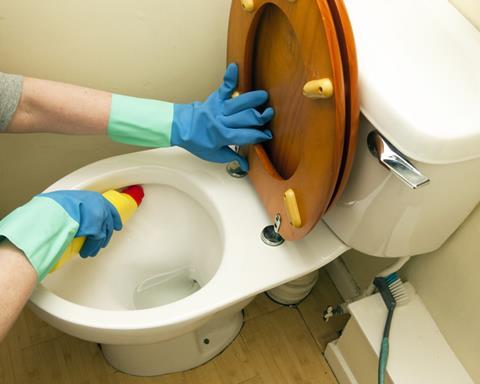
3. Bleach and toilet products dropped -6.2% in the independent channel
Nielsen
While the WFH trend continues, the loos in offices and factories have reopened – which could account for indie sales of toilet products dropping down the drain. However, it’s worth remembering that sales peaked during the pandemic (when home toilets took a pounding) and this represents a return to business as usual.
Meanwhile, taken in isolation, some brands are doing well. Fabulosa includes a number of toilet-tackling products in its range and reports 9% growth year on year with total sales of £42.8m in 2022 (Fabulosa). Part of its appeal is innovating through scent in the category.
“The UK Disinfectant Market was down 21% in value and down 29% in volume for the 52 weeks to October 2022 [Kantar] – so in isolation, we view Fabulosa’s annual growth as an incredibly positive result amidst an incredibly tough retail landscape,” says Adam Burnett, group marketing director at Fabulosa.
And on the subject of drains, Richard says that one of the expected big sellers in his store is sink unblocker.
“I think long hair getting stuck down the drain is a problem for students in the house shares we have around Southampton,” he says.
“There’s young people moving out of home and maybe before it was Mum and Dad who unblocked the shower tray. But now they’re finding they have to do it themselves!”
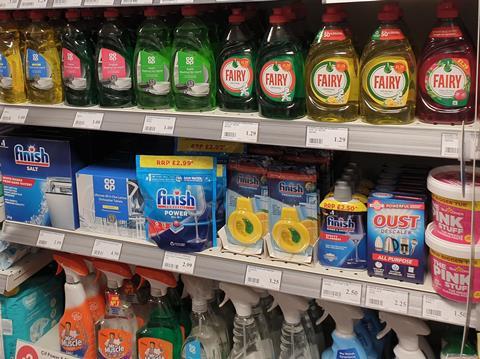
4. Rising costs are seeing some consumers switch to own brand products
It’s a mixed picture for own-brand cleaning in c-stores. On the one hand retailers like Richard go big on brands to signpost the category. But other retailers are doubling down on value as they see shoppers struggling with the cost of living. “We have about four metres of cleaning products and we really go for the value,” says Julie Kaur who runs Premier Jules Convenience Store in Telford.
“What with household bills going up and everything it just makes sense for our customers. So we have a couple of brands in there (like Fairy Liquid). But we’ve seen brand prices for things like furniture polish really rise – and customers won’t have it.”
There’s outward signs brands are feeling the sales heat. Cleaning giant Reckitt Benckiser (maker of Dettol) reported a decline in sales volumes in 2022 and blamed inflation pressures on customers for the drop.
Own label cleaning products manufacturer McBride says: ”There is increasing evidence that consumers are changing their buying behaviour as a result of the inflationary pressures being felt by all. Whether this is a product switch to private label in a general retailer or consumers switching to discount stores from general retailers, both hold good prospects for private label volumes. With many branded products reducing product quality to offset inflation, the value proposition of price versus quality of private label offers becomes even more compelling.”
However, Stanton maintains there hasn’t yet been a major move away from brands in c-stores.
“Shoppers are switching to own label, but the shift is less pronounced in household and hygiene than in many other categories,” he says.
“Shoppers see brands as the experts, and during the pandemic people wanted cleaning and hygiene products that they could rely on to stop the spread of infection. Brand loyalty continued after the restrictions ended and life returned to normal.”
Unilever acknowledges the shift towards own label, but states that brand loyalty remains strong for many. “Whilst the category is seeing growth in own label products, we’re also seeing shoppers manage their budget through price promotion of branded products with many shoppers staying loyal to the brands they know they can rely on when it comes to superiority of performance and cleaning efficacy,” says home and hygiene category lead Claire Racklyeft. “Unilever value sales are growing ahead of the market (Nielsen), demonstrating that there isn’t a one size fits all solution as all shoppers manage their spend differently (Nielsen). A brand that continues to shine is Domestos, which is the UK’s number one toilet and bleach brand (Nielsen).”
Names like Fabulosa are doing their bit to offer value too.
“We have made a firm commitment to not impose any cost price increases to products manufactured by Fabulosa ourselves, in our efforts to support consumers with the cost-of-living crisis while enabling our valued retail and wholesale partners to maintain an attractive commercial proposition,” says Burnett.
It’s also released a new Simply Fabulosa range of 350ml limited edition ready-to-trigger sprays for 59p, available in January and February.
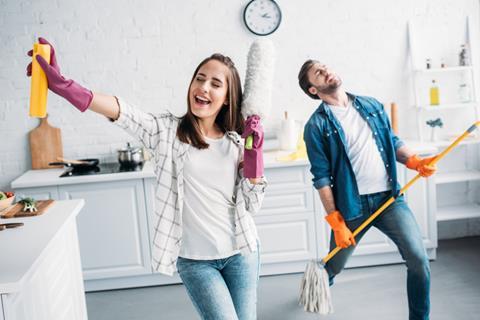
5. Post-Covid cleaning brands need to ‘re-engage’ consumers
The fact that fewer consumers are now worried about Covid-19 infecting their living spaces is fantastic news for everybody. But it does mean that sales of household cleaning products run the risk of stagnating.
There has been a year-on-year decline in household cleaning and specialist cleaning at -19.4% and -14.2% respectively in the independents channel (Nielsen). ”[Total] sales in the household cleaning and specialist cleaning categories have declined since the heights of the pandemic but are still +13% higher than 2019 before the pandemic [Nielsen], showing that newly learned habits have stuck,” says Stanton.
Mintel says that there’s a danger of consumers feeling ‘disengaged’ with the market. It says brands can address this by focusing on home workers who spend more time at home and want their living spaces clean and tidy for Zoom calls. It also maintains that cleaning is always going to be protected by its ‘needs-based status. Or to put it another way – if your cat has puked on your hallway carpet, you’re not going to delay running to the corner shop.
“I think it’s one of those things,” says Richard.
“If you need a carpet cleaner, you need a carpet cleaner! Convenience is key. And whether that carpet cleaner is three quid or five quid is probably by the by because you’re focused on sorting out the problem. That’s where we come in.”
The need to clean is also likely to grow as the economic situation deteriorates. ”As financial worries worsen through the year, shoppers will choose to spend more time at home, which will drive a natural increase in the need to clean, and therefore increase the amount spent on cleaning, hygiene and dish washing products,” says Stanton.
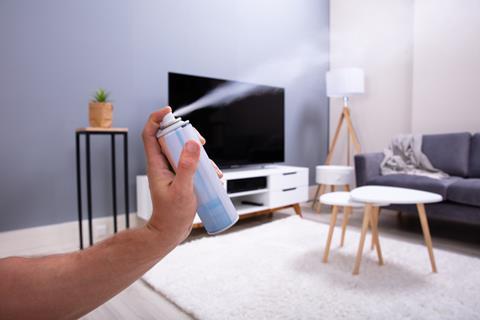
6. Air Care dips -5.5% year-on-year in independents
Nielsen
The £6.3m Air Care has declined by -5.5% over the past year in independents (Nielsen). ”Many shoppers are looking to save money, and spend in many non-essential categories is declining,” says Stanton. ”However, whilst some shoppers see Air Care as non-essential, many others deem it a day-to-day necessity, for example to eliminate pet odours, and this is mitigating the decline somewhat.”
What’s more, Air Care is also seen as an affordable luxury, and many shoppers are trading up, claims DCS. “With many people opting to spend more time at home rather than going out, due to budget constraints, shoppers are looking for affordable ways to improve their home environment,” says Stanton.
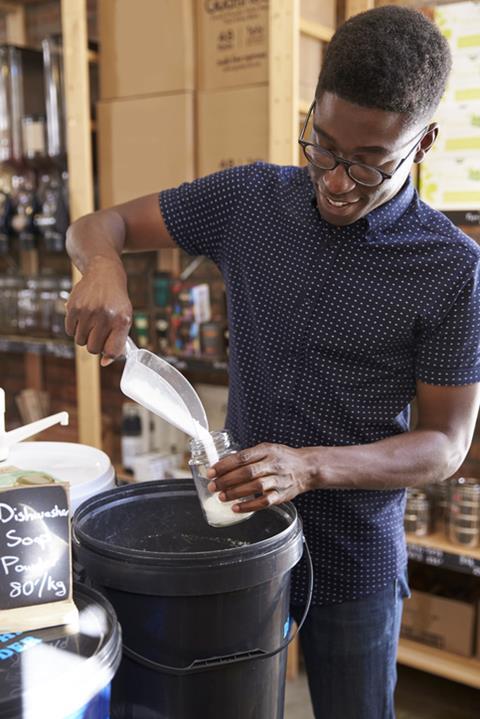
7. Sustainable cleaning is becoming mainstream
Another key factor in cleaning product purchases is sustainability. “As the perceived threat to the environment grows, there is no doubt that people are taking far more responsibility for the decisions they make than they used to,” claims Mintel Analyst Richard Hopping in a 2022 Mintel Blog on The Future of Sustainability in Household Cleaning. “The launch of cleaners in concentrated formats has continued to take hold, creating the advantage of cutting down on the amount of plastic needed for packaging and encouraging reuse of existing plastic trigger spray bottles.”
Unilever agrees that going green is the way forward. “We know there is shopper demand for sustainability, but there’s still a job to be done with helping shoppers on a wider scale understand the value of reusable packaging and the importance of returning empties so that they can be cleaned and refilled,” says Nadine Slyper, laundry marketing director, Unilever. In recent years, the firm has partnered with multiple stores to trial selling refills of cleaning brands and it now plans to bring this to shoppers at scale.
The company is also focussed on sustainable packaging, like its new Domestos Power Foam which comes in a bottle that is made from 50% post-consumer recycled plastic (PCR). The bottle uses less virgin plastic compared to other bleach bottles on shelf and is recyclable, once the trigger and sleeve are removed.
McBride is also improving its sustainability credentials in line with consumer demand, but notes that sustainability must not come at the cost of value. “Increasing consumer demand for sustainable products could enable McBride plc to increase its market share,” the firm noted in its 2022 annual report. “This opportunity will be maximised if sustainable products are affordable to consumers, otherwise consumers may choose more affordable less sustainable products due to budget constraints.” In 2022, the firm stopped the use of all flexible PVC pouches, moving them to a new mono-material to improve recyclability. Its Liquids and Unit Dosing divisions are both working on non-plastic packaging solutions, with both business units bringing cardboard alternatives to market in the next twelve months.
Fabulosa concurs that most consumers aren’t willing to pay more for sustainable cleaning products. “The sustainable cleaning market has certainly benefitted from the increased consumer appetite for more environmentally friendly products,” says Burnett. “However, in general terms, for the majority of consumers, we believe sustainability has to be affordable, particularly in today’s tough economic environment. At Fabulosa, we are keen to work with our customers to support them in making achievable switches in behaviour, so they can shop within existing price competitive ranges, thereby assisting to protect the environment and their pockets at the same time.”
The firm has been certified for its commitment to the Charter for Sustainable Cleaning and all new products across the range will now carry the Charter conformity mark, signifying its dedication to continuous improvement in its environmental practices and impact.




















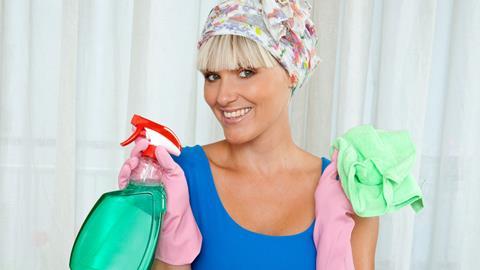
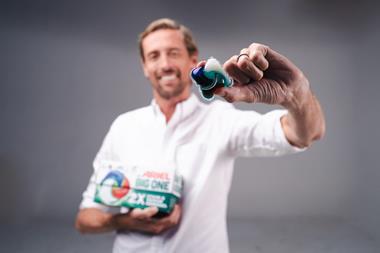
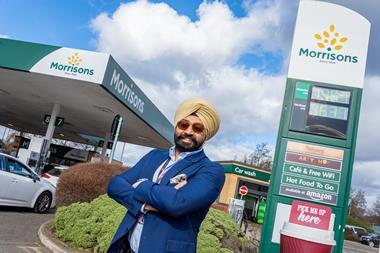
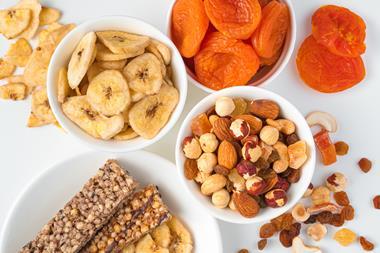


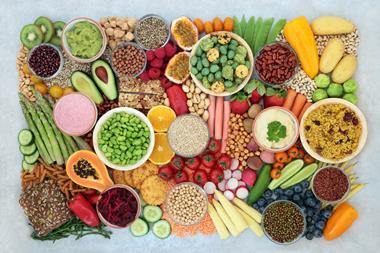
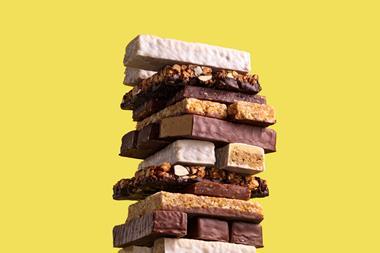

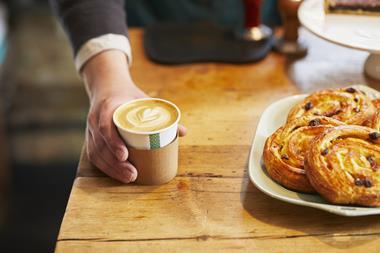



No comments yet